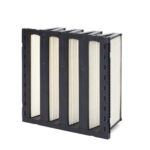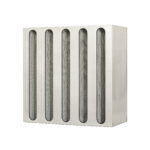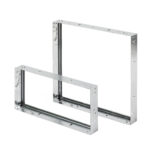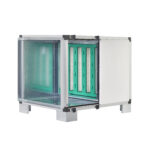Venfilter Safety Spaces products for ventilation and air conditioning in public and commercial spaces
We offer a wide range of certified products suitable for use in public and commercial environments

Protect people and your business
In public spaces (offices, restaurants and shopping centres, airports, schools, gyms, etc.) indoor air quality can affect both the health of individuals and businesses. However, poor air quality also has a negative impact on the mood of customers.
In the design and construction of these public spaces, it must be ensured that unwanted airborne particles are controlled and the adverse effects on human health and comfort are reduced or minimised. This can be done through air treatment, conveying, filtration and supply air. Ensuring a high level of cleanliness of pollutants.
90% of the population spends 90% of our time in enclosed spaces. It is everyone’s duty to take care of these spaces so that they are not harmful to our health.

Applications
Click on each application in our Venfilter Safety Spaces range and find out how we can help you improve your processes.
Why air filtration systems for public spaces?
In crowded public spaces, air can become a risk, due to microbiological contamination.
The microscopic dimension of the sources of pollution, due to their size, hinder the problem, because the air contains different microorganisms:
- Pollen 10 microns
- Viruses between 1/100 and 1/1000 micron
- Bacteria between 0.2 and 10 microns
- Fungal Spores varies between 1 and 10 microns
A cubic metre of outdoor air can contain between 200 and 1500 bacteria. In a ventilation system with an airflow of 10,000 m3/h we can introduce between 2 to 10 million bacteria per hour into a crowded space. This can lead to air pollution and affect people’s health and comfort.

Sources of contamination
In public spaces, the main sources of microbiological air pollution can vary depending on the installations, flows of people, raw materials, etc.
Particular care must be taken with ventilation ducts, as the air may not be properly filtered and contaminants such as dust, pollen and suspended bacteria may be allowed to circulate freely. Mould and spores present in the moisture in these same ducts can also become a problem beyond air quality.
The function of an overall ventilation system is to provide airflows with the ideal temperature, humidity and air quality in the various areas. Providing clean air to equipment to remove airborne contaminants from critical areas.
Filter and air conditioning in public and commercial spaces
Venfilter filters and filter media are certified and comply with the most demanding regulations for installations of especially crowded public spaces.
These spaces must have good indoor air quality to avoid microbial loading. Temperature and humidity need to be controlled. Only reliable systems with highly efficient filters can provide these types of controls. To prevent the air conditioning system from becoming colonies of microbes, temperature and humidity must be controlled and accumulated organic matter removed, as clogged exchangers provide good support for the development of microorganisms.
Ensure health and comfort in public and commercial spaces. Venfilter offers filtration solutions for hygienic HVAC systems that are sensitive to microbial contamination Talk to our experts!








































































